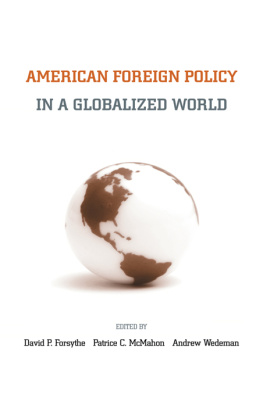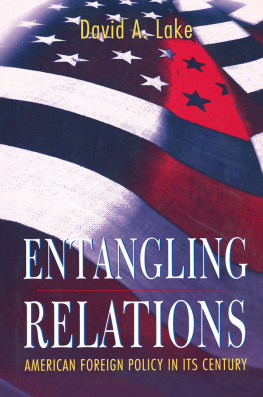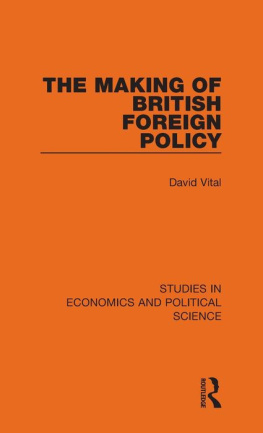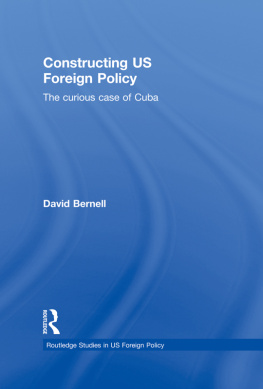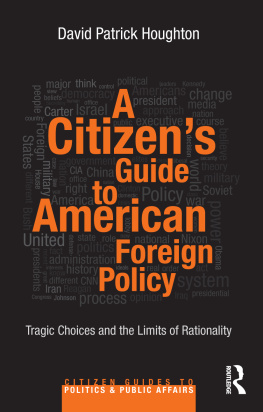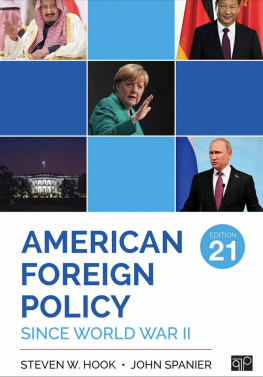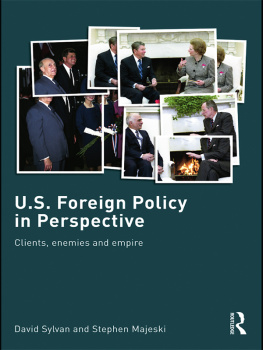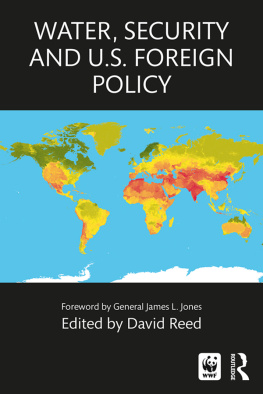AMERICAN FOREIGN POLICY
IN A GLOBALIZED WORLD
AMERICAN FOREIGN POLICY
IN A GLOBALIZED WORLD
EDITED BY
David P. Forsythe
Patrice C. McMahon
Andrew Wedeman
Published in 2006 by
Routledge
Taylor & Francis Group
270 Madison Ave,
New York NY 10016
Published in Great Britain by
Routledge
Taylor & Francis Group
2 Park Square,
Milton Park, Abingdon,
Oxon, OX14 4RN
2006 by Taylor & Francis Group, LLC
Routledge is an imprint of Taylor & Francis Group
Transferred to Digital Printing 2008
International Standard Book Number-10: 0-415-95397-9 (Softcover) 0-415-95396-0 (Hardcover)
International Standard Book Number-13: 978-0-415-95397-9 (Softcover) 978-0-415-95396-2 (Hardcover)
Library of Congress Card Number 2005031290
No part of this book may be reprinted, reproduced, transmitted, or utilized in any form by any electronic, mechanical, or other means, now known or hereafter invented, including photocopying, microfilming, and recording, or in any information storage or retrieval system, without written permission from the publishers.
Trademark Notice: Product or corporate names may be trademarks or registered trademarks, and are used only for identification and explanation without intent to infringe.
Library of Congress Cataloging-in-Publication Data
American foreign policy in a globalized world / edited by David P. Forsythe, Patrice McMahon and Andrew Wedeman.
p. cm.
Includes bibliographical references and index.
ISBN-13: 978-0-415-95396-2 (hardback) ISBN-13: 978-0-415-95397-9 (pbk.)
1. United States--Foreign relations--2001- 2. Bush, George W. (George Walker), 1946---Political and social views. 3. Globalization-Political aspects. 4. Unilateral acts (International law) I. Forsythe, David P., 1941- II. McMahon, Patrice C. III. Wedeman, Andrew Hall, 1958-
E902.A468 2006
327.73009'0511--dc22
2005031290
Visit the Taylor & Francis Web site at http://www.taylorandfrancis.com
and the Routledge Web site at http://www.routledge-ny.com
Contents
Doctrinal Unilateralism and Its Limits:
America and Global Governance in the New Century
Article 2(4) on the Nonuse of Force:
What Were We Thinking?
Sovereign Inequality and Hierarchy in Anarchy:
American Power and International Society
American Public Opinion and Foreign Policy:
Did the September 11 Attacks Change Everything?
Supervising Americas Secret Foreign Policy:
A Shock Theory of Congressional Oversight for Intelligence
Democracy Promotion and American Foreign Policy:
Afghanistan, Iraq, and the Future
Draining Swamps and Transplanting Values:
Nation Building and the American Military
The United States and Europe:
Explaining the Transatlantic Bond
Acknowledgments
This book was made possible through the generosity of G. E. Hendricks, an alumnus of the University of NebraskaLincoln (UNL). Hendricks had a lively interest in American politics and was especially concerned about the limitations on public discussion during the McCarthy era of the early 1950s. So in the period 19491957 he gave the Nebraska Foundation a substantial sum of money to be used to address current controversial political questions in a nonpartisan, unbiased manner.
With the support of the G. E. Hendricks fund, in April 2005 we brought to the UNL campus a number of distinguished commentators on American foreign policy for a two-day conferencethe nineteenth meeting held in the Hendricks series. We subsequently invited other experts to join this group to contribute to American Foreign Policy in a Global World. Quite clearly contemporary American foreign policy is controversial, principally because of the Bush doctrine of preemptive, unilateral war and its application to Iraq. There is no doubt that these strategic orientations, along with other assertions of American unilateralism and exceptionalism, have sparked intense controversies at home and abroad. We and our coauthors have certainly tried to address, in a nonpartisan, unbiased fashion, Bush foreign policy and whether it is sustainable in an interdependent and integrated world. We have attempted to remain committed to the values articulated by Hendricks.
We are especially grateful not only to the Hendricks fund but also to the UNL Department of Political Science, which administers the Hendricks Fund. Jack Comer, chair of the department, was most supportive, as was Helen Sexton, the departments administrative assistant. We are also grateful to the Cooper Foundation and the E. N. Thompson Forum on World Issues for sponsoring Dr. John Ruggie. Also lending cheerful support was Kim Weide, the events coordinator for the UNL College of Arts and Sciences, along with Carrie Althoff, Evan Litrell, and Carrie Heaton. It was a pleasure to work with Robert Tempio, Richard Tressider, and Stephanie Drew of Routledge.
David P. Forsythe
Patrice C. McMahon
Andrew Wedeman
Introduction: Sustaining American Power in a Globalized World
PATRICE C. McMAHON AND ANDREW WEDEMAN
Throughout the 1990s the United States seemed to defy both history and international relations theory. Its resources were unrivaled, and the concentration of power in its hands unprecedented. Its military might, economic vitality, and cultural influence, alongside its willingness to provide global public goods auguredat least to somea fundamental transformation in world politics. The unipolar structure of the international system, however, did not translate into the end of history or even to a more peaceful world order. Nor did it mean that the sole superpower would respond to international crises alone; with notable exceptions, multilateralism was the means of choice for the United States. Some use of U.S. power proved controversial, as when Russia and China objected to and sought to condemn the North Atlantic Treaty Organization (NATO) bombing of Serbia in 1999 as led by Washington, D.C. But in the 1990s there was not a broad and vigorous challenge to U.S. primacy.
In hindsight, these observations about the nature of the post-Cold War world proved short lived, if not wholly mistaken. After the attacks on New York City and Washington, D.C. on September 11, 2001, the George W. Bush administration adopted a profoundly different approach to the use of American power resources. Articulated formally in 2002, the Bush administrations grand strategy emphasized American unilateral power and the right to preemptive attack. As the 2002 National Security Strategy explains, We must adapt the concept of imminent threat to the capabilities and objectives of todays adversaries To forestall or prevent such hostile acts by our adversaries, the United States will, if necessary, act preemptively. Thus, a decade after the end of the Cold War, the United States began behaving like a traditional great power. It defined its national interests more narrowly (while asserting that what was good for the United States was also good for the rest of the world) and viewed its overarching conventional military strength as a means to accomplish its goals.
Discussions of the U.S. position in the world, its expansive ambitions, and unipolarity have produced a number of noteworthy books, many of which compare Americas power to previous empires or provide theoretical justifications for why a unipolar system cannot last. Although this project draws on these debates, it focuses centrally on contemporary foreign policy behavior, its defining characteristics, and, most importantly, its effects. How is the foreign policy of the George W. Bush administration different from previous governments? What role, if any, have domestic actors played in facilitating these foreign policies? Has the administration succeeded in making the U.S. homeland secure or in accomplishing its other declared priorities? Finally, how has this turn in foreign policy affected the role of the United States in different regions of the world?



